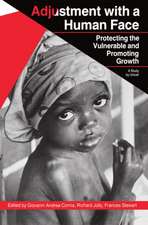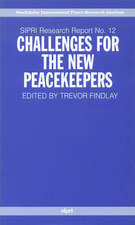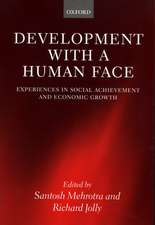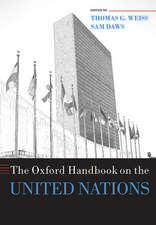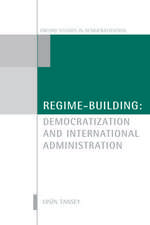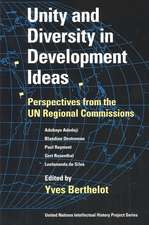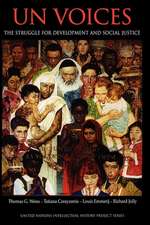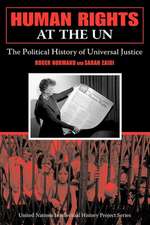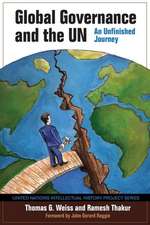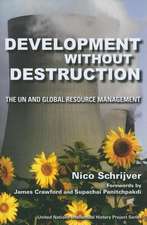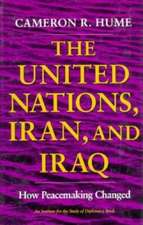UN Contributions to Development Thinking and Practice
Autor Richard Jolly, Louis Emmerij, Dharam Ghai, Frédéric Lapeyreen Limba Engleză Paperback – 17 iun 2004
Preț: 326.74 lei
Nou
Puncte Express: 490
Preț estimativ în valută:
62.53€ • 65.04$ • 51.62£
62.53€ • 65.04$ • 51.62£
Carte tipărită la comandă
Livrare economică 14-28 aprilie
Preluare comenzi: 021 569.72.76
Specificații
ISBN-13: 9780253216847
ISBN-10: 0253216842
Pagini: 400
Dimensiuni: 156 x 235 x 15 mm
Greutate: 0.62 kg
Editura: MH – Indiana University Press
Locul publicării:United States
ISBN-10: 0253216842
Pagini: 400
Dimensiuni: 156 x 235 x 15 mm
Greutate: 0.62 kg
Editura: MH – Indiana University Press
Locul publicării:United States
Cuprins
Part One: Values and History 1. Has There Been Progress? Values and Criteria for UN History; 2. The History of Development Thinking from Adam Smith to John Maynard Keynes Part Two: Ideas and Action 3. The 1940s &1950s - the Foundations of UN Development Thinking and Practice; 4. The 1960s - The UN Development Decade: Mobilizing for Development; 5. The 1970s - Equity in Development; 6. The 1980s - Losing Control and Marginalizing the Poorest; 7. The 1990s - Rediscovering a Human Vision; 8. Building the Human Foundations; 9. Structural and Sector Change Part Three: Outcomes and the Future 10. The Record of Performance; 11. UN Contributions and Missed Opportunities; 12. Lessons for the Future: Development Thinking and the UN's Future
Recenzii
One of the titles in a projected 14--volume series sponsored by the United Nations Intellectual History Project (see also Michael Ward's book in this series, Quantifying the World: UN Ideas and Statistics, CH, Oct'04), this institutional history of the UN is surprisingly readable. The product of four authors' collaboration, it tells an interesting story of UN work in development theory and practice. After a brief review of development literature, the authors break down the UN experience into five major periods. The 1940s and 1950s were foundational, with the work of Raul Prebisch and many others promulgated under UN auspices. The 1960s were the decade of development, first declared by John F. Kennedy in 1961. The 1970s saw a focus on equity in development, and the 1980s saw UN agencies being eclipsed by the International Monetary Fund and World Bank. By the 1990s, the UN Development Program restored a focus on human development that had been lost earlier. Concluding with a review of UN development ideas, the authors describe successes but do not hesitate to point out failures. Well organized and well written, this book will be essential reading in international organization or economic development courses. Summing Up: Highly recommended. Public, academic, upper--division undergraduate and up, and professional library collections.S./P>--S. Waalkes, Malone College"Choice" (01/01/2005)
Notă biografică
Richard Jolly is Senior Research Fellow at the CUNY Graduate Center, where he is co-director of the United Nations Intellectual History Project.
Louis Emmerij is Senior Research Fellow at the CUNY Graduate Center, where he is co-director of the United Nations Intellectual History Project.
Dharam Ghai is Advisor to the International Labour Organization.
Frédéric Lapeyre is Professor at the Institute of Development Studies, Catholic University of Louvain, and a member of the United Nations Intellectual History Project.
Louis Emmerij is Senior Research Fellow at the CUNY Graduate Center, where he is co-director of the United Nations Intellectual History Project.
Dharam Ghai is Advisor to the International Labour Organization.
Frédéric Lapeyre is Professor at the Institute of Development Studies, Catholic University of Louvain, and a member of the United Nations Intellectual History Project.
Descriere
A history of the impact of the UN's ideas on development and a forecast of their future in the 21st century.

